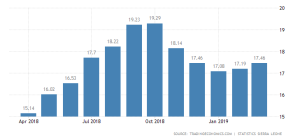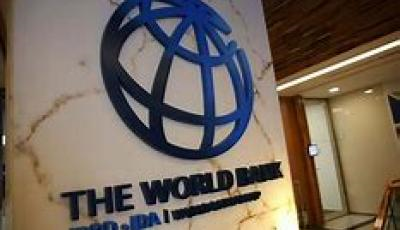Unlocking the bottlenecks to robust and sustained real growth through economic diversification and addressing pre-existing macroeconomic weaknesses will be crucial for building a resilient economy that promotes inclusive growth and reduces poverty, according to the new World Bank Sierra Leone Economic Update (SLEU).

The country’s macroeconomic situation remains challenging despite the bold and courageous policy measures taken by the new government.
Growth is still low (3.7%), inflation and exchange rate depreciation are high (16.8 and 11.8% respectively), the fiscal and current deficits are high (6.6 and 13.8%, respectively), and increasing debt has resulted in the country being downgraded from moderate to high risk of debt distress.
However, the medium-term outlook is promising, with growth expected to reach 5.2%t by 2021, driven primarily by supply side factors, including favourable agricultural output, uptick in mining activities and strong performance of the services sector, the report noted.
“There is an urgent need for Sierra Leone to develop a comprehensive strategy for deepening the financial sector and this is required to ensure poverty reduction, job creation, investment and growth in the country,” said Gayle Martin, World Bank Country Manager for Sierra Leone.
The Sierra Leone Economic Update (SLEU) is an annual publication that reports on and analyzes recent economic developments, reviews regional and global contexts and analyzes the implications for the country, and presents the medium-term outlook and prospects for the economy.
The 2019 Update features a selected topic relevant to promoting inclusive growth and poverty reduction, namely Financial Inclusion for Economic Growth and Development. The target audience for the SLEU includes policy makers, business leaders, development partners and analysts interested in Sierra Leone’s economy. Sierra Leone’s macroeconomic situation remains challenging despite the bold and courageous policy measures taken by the new Government, which assumed office just over a year ago.
Macroeconomic imbalances remain in both the fiscal and external accounts. Growth is still low (3.7 percent); inflation and exchange rate depreciation are high (16.8 and 7.3 percent, respectively); the fiscal and current deficits are high (6.6 and 13.8 percent, respectively) and increasing debt has resulted in the country being downgraded from moderate to high risk of debt distress.
Unlocking the bottlenecks to robust and sustained real economic growth through economic diversification and addressing pre-existing macroeconomic weaknesses will be crucial for building a resilient economy that promotes inclusive growth and reduces poverty. The medium-term outlook is promising, with economic growth expected to reach 5.2 percent by 2021, anchored primarily by supply side factors, including favorable agricultural output, uptick in mining activities and strong performance of the services sector.
The special topic of the 2019 Update focuses on deepening the financial sector for inclusive economic growth and development. Usage of the financial system is low in Sierra Leone with only about 5 percent of adults using formal savings products and about 54 percent saving money within the past year. Access to finance for enterprises is a significant barrier to growth of the private sector with 40 percent of firms indicating lack of credit as their biggest constraint. Only 11 percent of Sierra Leoneans have mobile money accounts compared to 20.8 percent in Liberia, 38.9 in Ghana and 72.9 percent in Kenya.
The government plays a significant role in the financial sector and could spur financial sector development by creating the financial infrastructure to provide financial services to underserved populations. Bolstering the role of Digital Financial Services in Sierra Leone is critical to ensuring affordable and accessible financial services through, for instance, mobile phones.
We are pleased to present a rich menu of policy options in this second edition of the SLEU. It is my hope that this 2019 Update will inform and stimulate policy debate and help set an agenda for prioritizing financial sector development in Sierra Leone. Henry G. R. Kerali Country Director for Ghana, Liberia and Sierra Leone World Bank 6 Acknowledgements The Sierra Leone Economic Update is a product of the Macroeconomics, Trade and Investment Global Practice of the World Bank. The first part of the report was prepared by Youssouf Kiendrebeogo (Senior Economist and co-TTL, GMTA3) and Kemoh Mansaray (Senior Economist and co-TTL, GMTA3).
The second part was prepared by a team of the Finance, Competitiveness & Innovation Global Practice led by Rinku Chandra (Lead Financial Sector Specialist, GFCAS), including Nicholas Timothy Smith (Financial Sector Specialist, GFCAS), Anita M. Schwarz (Lead Economist, GSP08), Franz Joseph Le Lesle (Consultant, GFCAE) and Alari Hasanatu Ijileyoh Mahdi (Consultant, GFCAS). The Report was prepared under the overall guidance of Abebe Adugna (Practice Manager, GMTA3), Gayle Martin (Country Manager, AFMSL), Henry G. R. Kerali (Country Director, AFCW1), and Errol George Graham (Program Leader, AFCW1). The report benefited from useful comments and suggestions from the following peer reviewers: Max Rudibert Steinbach (Senior Economist, GMTPG), Mamadou Ndione (Senior Economist, GMTN1) and Cedric Mousset (Lead Financial Sector Specialist, GFCFS). The team also acknowledges constructive comments received from Harish Harish Natarajan (Lead Financial Sector Specialist, GFCFI). Fatu Karim-Turay (Executive Assistant, AFMSL), Lydie Ahodehou (Program Assistant, GMTA3), and Karima Laouali Ladjo (Program Assistant, GMTA3) provided relentless administrative support. The team would like to thank the Sierra Leone authorities for their hospitality and fruitful collaboration.
Key risks to the growth outlook
Key risks to the growth outlook include a deterioration in Sierra Leone’s terms of trade; lower than anticipated FDI inflows and the effects on the exchange rate and prices; fiscal slippages including adverse debt dynamics; and financial sector weaknesses.
“Whether Sierra Leone can promote sustained inclusive growth and reduce poverty depends on whether it can modify the structure of the economy to generate more and better-paid manufacturing and service jobs. That could be accomplished by facilitating creation by the private sector of formal manufacturing and services activities and increasing the productivity of the informal sector,” stated Martin.
The SLEU is an annual publication that reports on and analyses recent economic developments, reviews regional and global contexts and analyses the implications for the country, and presents the medium-term outlook and prospects for the economy.
The 2019 Update focuses on promoting inclusive growth and poverty reduction, namely ‘Financial Inclusion for Economic Growth and Development’.
The target audience for the SLEU includes policy makers, business leaders, development partners and analysts interested in Sierra Leone’s economy.
Inclusive economic growth
The special topic of the 2019 Update focuses on deepening the financial sector for inclusive economic growth and development.
The report notes that usage of the financial system is low in Sierra Leone with only about 5% of adults using formal savings products and about 54% saving money within the past year.
Access to finance for enterprises is a significant barrier to growth of the private sector with 40% of firms indicating lack of credit as their biggest constraint.
Only 11% of Sierra Leoneans have mobile money accounts compared to 20.8% in Liberia, 38.9 in Ghana and 72.9% in Kenya.
“The government plays a key role in developing the financial sector through promoting resilience and stability. One of the key functions that needs to be established is an effective supervision and regulatory regime for financial institutions to address market failures like anti-competitive behaviour, market misconduct, information asymmetries, and systemic instability, which can negatively impact financial sector development, economic growth, and shared prosperity,” said Youssouf Kiendrebeogo, World Bank Senior Economist and one of the authors of the SLEU.




